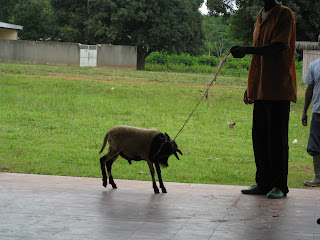This week we've been preparing for a conference and 3 week-long trainings for all the health workers in the districts we work in.
We work closely w/ government officials, specifically the
Ministère de la Santé et d l'Hygiène Publique and the
Programme National de Santé Infantile. I've mentioned before, it took the Ministry 4 months (and numerous meetings and presentations) to agree to support our community case management (CCM) project. And even now, we only have their oral consent. So to guarantee the government's continued cooperation (especially in light of the upcoming elections which might result in a new administration), my organization along w/ UNICEF will be holding a conference to validate our CCM tools. Health officials and prominent doctors are invited to a multi-day conference to learn about our project and look at the tools we'll be using to implement the project (i.e. the training manual, teaching aides, supervision check-lists). It's ceremonial really, a way to get buy in from medical community and ensure continued government support for our program.
Its also a good way for administrators to make extra money.. Participants, in addition to their salaries, receive a per diem and, if the conference is not in their city, transportation money in addition to meals and lodging. Government officials love
ateliers. The prime spot for conferences here is Bassam, a former capital and beach town about 45 minutes outside of Abidjan (just far enough so that participants will qualify for transportation money).
The trainings are for nurses and midwives that work in the rural health centers and will cover the ministry's new directives on IMCI (Integrated Management of Childhood Illnesses or in french
PCIME: prise en charge intégrée des maladies de l'enfant - it has not been easy relearning all these acronyms in french!). Because the ministry doesn't have enough funds to train everyone, part of our collaboration is to pay for the trainings in our districts. So basically we will be paying the ministry to do trainings that they should be holding on their own.
Seems messed up, no? Why is donor money, that should be helping the beneficiaries, families and children, going to ministry people to take trips to the beach and do what they should already be doing? It is frustrating to me. On the other hand I know how little ministry workers make, especially considering what they could make if they leave the country. They are all doctors, they could easily get visas out of here. If what we do supplements their income and is incentive enough to keep the good, smart people here, perhaps its worth it?
 These are my first sur terrain missions that actually feel sur terrain, as I'm getting to meet the nurses and midwives and the beneficiaries, like these kids:
These are my first sur terrain missions that actually feel sur terrain, as I'm getting to meet the nurses and midwives and the beneficiaries, like these kids: As part of the formalities, we sit in front of the village elders, give introductions and les nouvelles, thank you's all around. In the villages, most of the people don't speak French, so there's always some translation going on. For one of the traditional greetings in this area, the elders stand in front of us and repeat something in Baoulé while showing their palms to us, every time they repeat the greeting we respond by saying "yo". I have to figure out what it is they're saying, but the yo's kind of crack me up.
As part of the formalities, we sit in front of the village elders, give introductions and les nouvelles, thank you's all around. In the villages, most of the people don't speak French, so there's always some translation going on. For one of the traditional greetings in this area, the elders stand in front of us and repeat something in Baoulé while showing their palms to us, every time they repeat the greeting we respond by saying "yo". I have to figure out what it is they're saying, but the yo's kind of crack me up. After our second day of visits, we were given a goat:
After our second day of visits, we were given a goat: I'm excited to see what we'll get tomorrow!
I'm excited to see what we'll get tomorrow!



















